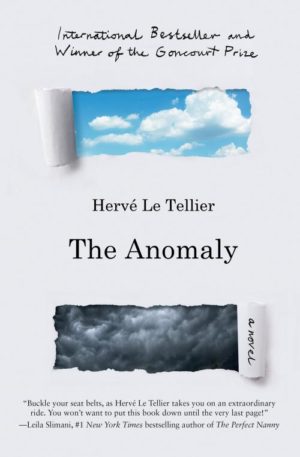You have no items in your cart. Want to get some nice things?
Go shopping
In the country of Balzac and Dumas, it has long been common for literary critics to lament the death of storytelling and to look towards American contemporary fiction with envy and awe. Yet, amidst the plethora of so-called autofiction works cluttering the shelves of French bookstores, the Goncourt Prize was awarded in 2020 to a novel whose prime achievement lies in its ability to narrate multiple stories. The national reading public is still showing its appreciation: The book boasts glowing selling figures. As the most enthusiastic readers have it, the book has at long last shaken French literature from its egocentric tendencies and its endemic lethargy. As a case in point, a television adaptation is on its way, proving that literary achievement is possible outside the narrow realms of pseudo-intellectual introspection. Or is it?
The Anomaly’s tone is pleasing at first, with lots of witticisms and an unceasing flow of second-degree comments about serial killers, mathematicians, and heads of state alike. The first part bravely keeps its promise of storytelling, taking us on an exciting journey brimming with auspicious developments. No brooding intellectual persona in sight; instead, a cast of colorful characters, including a hit man, a confused Nigerian gay pop star, an Afro-American female lawyer, a little girl and her pet frog, a French film editor, an architect, an airline pilot, and many others, all taken in a whirlwind of events after their Paris-New York flight goes wrong. The plane encounters an unusually strong storm, upon which an unprecedented duplication occurs: One aircraft lands in the United States, in March, while its exact replica, passengers and all, lands one hundred and six days later, in June. The situation triggers geopolitical trouble, and the American government deploys national security measures to silence the event.
The remaining, yet significant portion of the book, is dedicated to building a sophisticated set of hypotheses and scientific explanations. The author holds a degree in maths, which must have come in handy. His experience as a science journalist probably helped too, but the story remains entertaining, the plot unfolding in much the same way a blockbuster movie: fast, and increasingly furiously, as it nears its end. It explores the many narrative consequences of dealing with a duplicated set of people and the debates that rage between the characters – cloned or not – who are forced into this mess.
As enticing as this sounds, English-speaking readers should beware. Le Tellier’s artistic endeavour and philosophical overview are broader than the sum of the novel’s pages. He has published an impressive number of novels, plays and articles that make him a fixture in the French literary landscape – albeit with selling figures in the thousands, not the millions. More importantly, since 2019, he has presided over the Oulipo (a benign-sounding acronym that stands for “Ouvroir de Littérature Potentielle”), a group of mostly French writers, committed to creating works using constrained writing techniques, like their towering tutelary figures George Perec and Raymond Queneau. The former is known for having written an entire novel without ever using the letter “e”, (La Disparition or A Void in the English version). Constraints rule The Anomaly too, one in particular attempting to accommodate all literary genres in one, by presenting each subplot in a set of recognisable literary codes: the story of the hit man narrated like a thriller, the character of the mathematician set in a campus novel, and so on and so forth. The reader gets to taste every genre available as if at some giant literary buffet. Similarly, pastiched incipits of known and lesser-known novels are inserted at regular intervals, the opening of the “Spin Cycle” chapter for example, an intellectual tip-of-the-hat to Tolstoy: “All smooth flights are alike. Every turbulent flight is turbulent in its own way.” Some readers might find this more embarrassing than rewarding, but what can you do? The rules are what they are.
This growing discomfort, which sets in early on, appears to be the novel’s major problem: Behind its screen of jocular lightness, the novel takes itself quite seriously indeed. However learned and philosophical the undertext strives to be, the doubled characters of The Anomaly remain stuck in idiotic conundrums: what to wear to avoid identity confusion; how to make up for a scar that is missing on their replica’s body. We are led to expect metaphysical dilemmas, few of which ever come to fruition. So, when the narrator pompously declares “no one reads Dostoevsky these days,” one cannot help but cringe. It is a shame that a contemporary novelist who attempts to renew the Doppelgänger theme cannot learn from his elders. Witticisms, puns and the umpteenth-degree of detachment cannot make up for a lack of literary characterization, voice or language.
The novel does not so much fail because of its poorly handled sci-fi plot – after all, worse has been done on that plane – it fails more as literary matter. Every sentence reads like the script of a movie or a television series, as if the author, by desiring so much to be read by the masses, has adopted every trope and cliché available in TV. Characters are constantly in motion, operating in settings that depict our globalized world, using GPS and smart phones galore. They are one day in Paris, the next in New York, Bombay or Lagos, in decors that reek of déjà vu: People have coffee in a place that overlooks the Luxembourg gardens, they sip dry Martinis in Venice. The glamorous borders the sordid, but it is a sordid that never dares break beyond the familiar contours of mass representation. Should they be confused as to where they stand, readers are reminded that “this setting wouldn’t be out of place in Dexter,” or in a video clip for that matter. The great names of global pop culture proliferate at brisk pace: Lady Gaga, Beyoncé, Eminem, Rod Steward, Elton John, the Colbert Show, and – just to make sure that hip French readers are not left out – Vincent Cassel and Maïwenn. But these names never actually make room for any real playfulness or parody, as they would in the work of Salman Rushdie, for example. Here, name dropping remains painfully showy, the collision of the high and the low reading like the tedious classwork of a beginner’s course in post-modernism. When writers give up on the idea that their craft lies in words, readers end up with texts whose imagery is driven by other, lesser art forms. If the writer’s desire is to make a movie, why not make it and do away with literature?
Towards the end of the novel, a roundtable of religious leaders is convened to make sense of the supernatural mess and the reader rejoices, for here at last is an opportunity to generate highly comedic misunderstandings that are surely going to be a linguistic delight. But the meeting is pointless and wisely remains within the realm of the politically correct. Fair enough. This is not a great time for a writer to make fun of such things. But the same applies to every single topic that Le Tellier seeks to address: race, war, education, politics, show business, sickness, sexual abuse, the environment, ageing – the latter, like publishing, an apparently quite personal issue.
In the end, a perplexing realization emerges: The teeming characters may have dragged us all over the globe in their eventful lives, but at no point has the reader had access to their physical description, their language so plain and undifferentiated that we are left with a gallery of faces and bodies each as bland as the other with the result that few of them are memorable. Like those on TV, they may be in plain sight all the time, overwhelming us with their deeds and endlessly changing cliques, but nothing sticks around for long.
The novel ends with a calligram, in which readers and translators are invited to reconstitute a text presenting itself as a riddle. The words become fewer and fewer, the typeset like a funnel that whittles down to one last line that consists of a single letter. Should we understand this aesthetic dissolution as the ironic image of our reading experience? The new translation into English of this product of France, branded as global, entertaining, yet intellectual, reminds us that in French, “playful” translates as “ludique.” To my mind, this sounds alarming close to “ludicrous.”
by Hervé Le Tellier
Translated from the French by Adriana Hunter
Other Press, 400 pages

Cécile Seiller
Cécile Seiller is a writer living in Paris. She is also the mother of three children.




